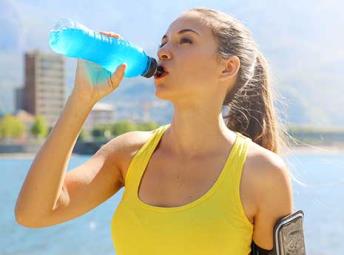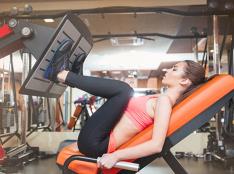Caffeine and Thermoregulation
In an ironic twist, the widely held belief that caffeine acts as a diuretic has prompted many professionals to advise against consuming caffeinated products prior to exercise--particularly when the environment is hot. There is also an assumption that diuresis may compromise thermoregulation and promote exercise-induced cramps. However, scientific data does not? support these notions.
In a 2007 review, Amstrong et al. (2007)? compiled a review of?30 previous papers to assess the diuretic effect, electrolyte excretion and thermal regulation influence during exercise. They concluded that caffeinated drinks can make up a substantial part of one's daily fluid intake and that those beverages appear no more diuretic than tap water. In reviewing several exercise studies using caffeine dosages as high as 600 mg, caffeine had no substantial effect on diuresis either at rest or during exercise. In regards to excretion of sodium and potassium, the data shows that caffeine can increase excretion of these electrolytes. However, based on nutrtional intake data from the U.S. Academy of Sciences, the typical American consumes more than enough compensate for these losses.
Regarding caffeine's overall affect on thermoregulation, the available data on runners, cyclists and walkers in moderate to hot environments all agree that caffeine intake has no significant influence on thermoregulation. The authors conclude that "...restricting dietary intake of caffeine is not scientifically or physiologically supported." While not specifically addressed in their review, it is also implausible that caffeine ingestion plays any role in cramping. While the mechanisms for exercise associated muscle cramping (EAMC) are still poorly understood, a review by Schwellnus et al. (2008) found no strong links between EAMC and either dehydration, environmental heat, or electrolyte imbalances. However, they did indicate that increased exercise intensity predisposed one to cramps.
As a coach and performance consultant, I am often asked to evaluate various training and nutritional strategies--including caffeine. Most athletes are looking an edge, but the line between science and hype is often blurred. Based on the available literature and my own experience, I've found that caffeine can be an effective performance aid in both training and competition. However, it is the responsibility of every athlete to understand how they respond to any supplement, as well as as the best strategy for their own sport.
?
 ?
?
Listen to the Caffeine Podcast Now
?
Chris Harnish, M.S. is an exercise physiologist with more than a decade of experience coaching junior and senior level endurance athletes from beginner to professional level.? A former category 1 cyclist and regional speed skating champion, Chris now competes in Xterra Running and duathalon events.? He resides in Richmond, Va and is working on his PhD at the McGuire VA Hospital's Spinal Cord Injury research center. He can be reached at esppodcast@gmail.com .
References
Armstrong L.E., D.G. Casa, C.M. Maresh, and M.S. Ganio. Caffeine, Fluid-Electrolyte, Termperature Regulation, and Exercise-Heat Tolerance. Exerc Sport Sci Rev. 35 (3): 135-140, 2007.
?strand P, K. Rodahl, H.A. Dahl, and S.B. Stromme. In: Textbook of Work Physiology: Physiological Bases of Exercise (4th ed). Human Kinetics Publishers, 2003.
Ganio M.S., J.F. Klau, D.J. Casa, L.E. Armstrong, and C.M. Maresh. Effect of caffeine on sport-specifc performance: A systematic review. J Strength Cond Res. 23 (1): 315-324, 2009.
Schwellnus M.P., N. Drew,? and M. Collins. Muscle Cramping in Athletes—Risk
Factors, Clinical Assessment, and Management. Clin Sport Med. 27: 183-194, 2008.
- 2
- of
- 2







Discuss This Article